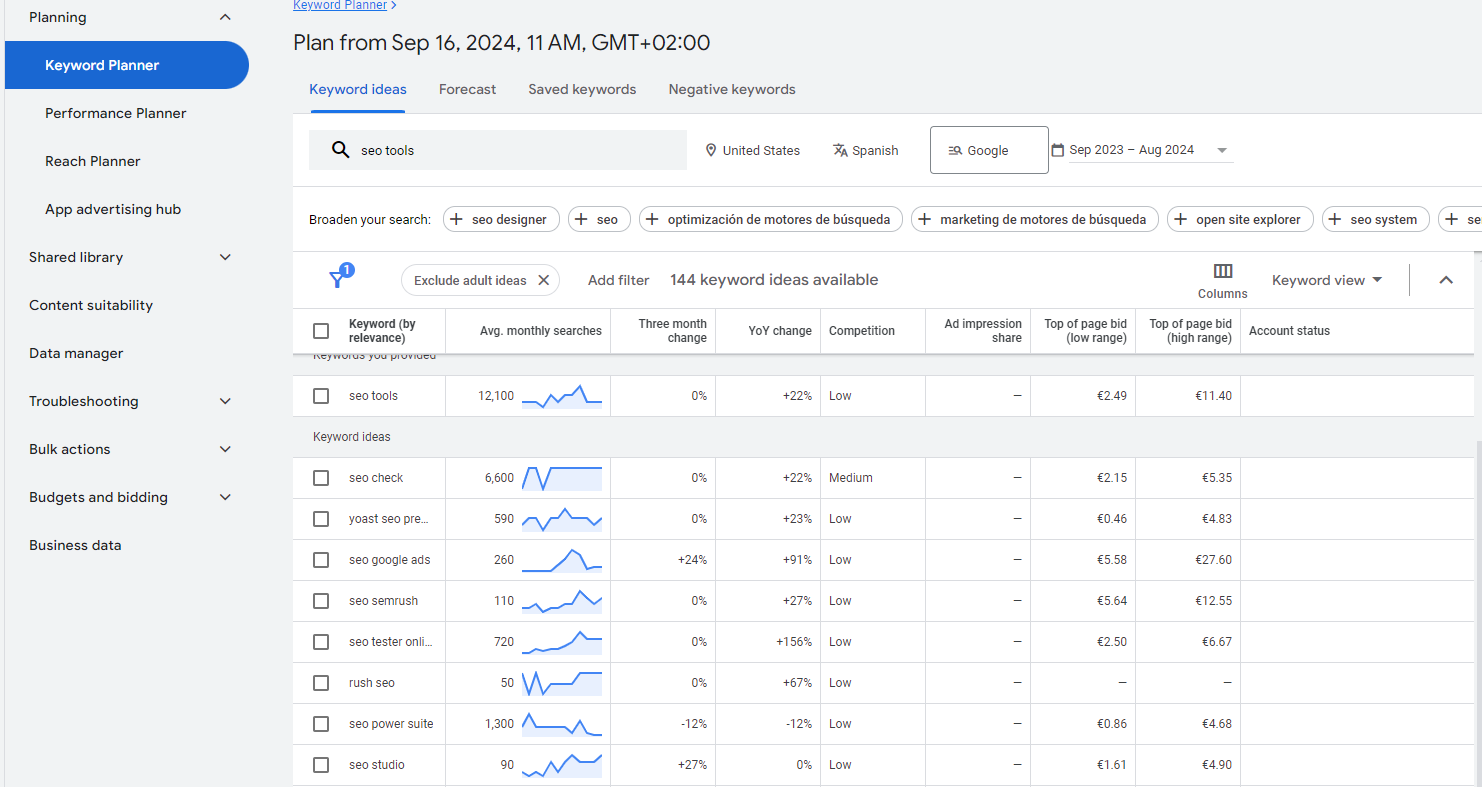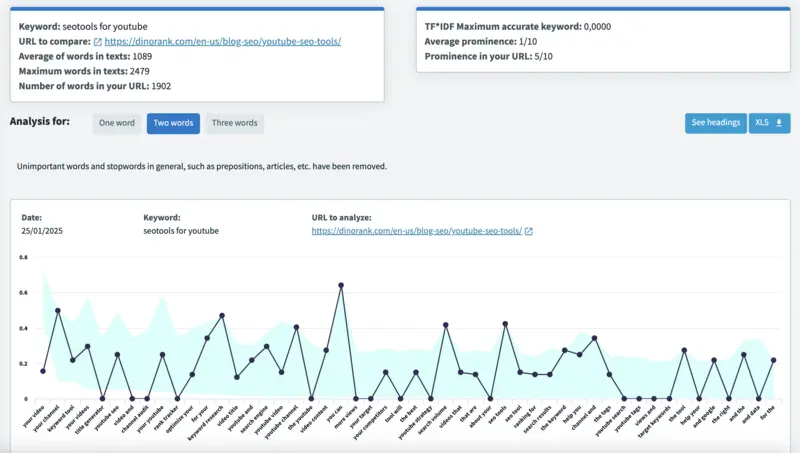Keyword relevance

Keyword relevance is a critical component of search engine optimization (SEO). It determines how well content aligns with user search queries and impacts search engine rankings.
Understanding keyword relevance helps in crafting content that meets user intent.
Effective keyword research and analysis can significantly enhance online visibility and engagement.
How to find relevant keywords?
Finding relevant keywords is an essential step in optimizing content for search engines.
This process involves several techniques and tools that help identify the phrases and terms potential visitors are using.
Analyzing search volume and trends
After identifying potential keywords, it is crucial to analyze their search volume and trends. This will help determine their popularity and relevance in the current market.
- Search volume: A higher search volume indicates that more users are searching for that keyword.
- Trends: Tools like Google Trends can reveal whether a keyword’s popularity is rising or falling over time.
- Seasonality: Some keywords may see spikes in search volume due to seasonal events or trends.
Identifying long tail keywords
Long tail keywords are specific phrases that typically have lower search volume but higher conversion potential.
These keywords are often easier to rank for and can attract targeted traffic.
Examples of strategies to identify long tail keywords include:
- Analyzing related searches in search engines to find specific queries.
- Using keyword tools that focus on long tail keywords and provide suggestions.
- Exploring forums and social media to see how users phrase their questions and topics of interest.
Tools to evaluate keyword relevance
Evaluating keyword relevance requires the right tools and metrics to ensure that content aligns with user queries and search intent.
Various resources and strategies can help assess the effectiveness of chosen keywords.
Google Keyword Planner

Google Keyword Planner is a vital tool for keyword research. It provides insights into search volumes, competition, and keyword suggestions.
By leveraging this tool, marketers can identify potential keywords that may enhance their search engine visibility.
DinoRANK: an all-in-one SEO tool to know keyword relevance
Many SEO keyword research tools are available to assist in evaluating keyword relevance. One of the most popular is DinoRANK, a powerfull Spanish all-in-one SEO tool.

With the TF*IDF and semantic prominence module you can find out which terms are most relevant from a semantic point of view.
The tool compares your URL (with respect to the given keyword) with the results on the first page of Google.
Thus, it tells you which words you are missing and which words you have too many of in your content.
Metrics for keyword relevancy
To measure the relevance of keywords effectively, several metrics should be analyzed:
- Search Volume: Indicates how often a keyword is searched, helping to assess its popularity.
- Keyword Difficulty: Measures how competitive a keyword is within the search landscape.
- Click-Through Rate (CTR): A high CTR signifies that users find the content relevant when it appears in search results.
- Bounce Rate: A low bounce rate can indicate that users are engaging with the content linked to the keyword.
Importance of keyword relevance in SEO
Understanding the importance of keyword relevance in SEO is crucial for improving website visibility and attracting valuable traffic. The effectiveness of a website’s content often hinges on how well it meets search engine criteria based on relevance.
Impact on search engine ranking
Keyword relevance significantly influences a site’s ranking on search engine results pages (SERPs). A higher ranking means increased visibility, which in turn can lead to more traffic.
When content closely matches the queries used by searchers, search engines are more likely to promote that content, elevating its position in search results.
Relevance for search intent
Aligning content with the user’s search intent is vital for providing valuable information.
Understanding what users seek ensures that the content not only meets their needs but also encourages them to engage further.
Key points related to relevance for search intent include:
- Identifying different types of search intent, such as informational, navigational, and transactional.
- Customizing content to address specific user queries effectively.
- Evaluating and adapting content strategy based on evolving user needs and expectations.
Connection with user engagement
High relevance of keywords fosters better user engagement. When content resonates with the audience, it leads to actions such as:
- Increased dwell time, as users spend more time on relevant pages.
- A lower bounce rate, indicating that visitors find what they are looking for.
- Higher likelihood of sharing content, thus extending its reach and authority.
Ultimately, the connection between keyword relevance and user engagement emphasizes the importance of crafting well-targeted content that meets the audience’s expectations.
Relevant content not only improves search visibility but also cultivates a stronger relationship with users.
What are highly relevant keywords?
- Characteristics of relevant keywords
- Relevance in search engine marketing
- Optimizing for content strategy
Highly relevant keywords are those that perfectly match the search intent of users and significantly enhance the visibility and engagement of content.
Understanding their characteristics is crucial for effective content strategy.
Characteristics of relevant keywords
Relevant keywords possess several key characteristics that make them essential for search engine optimization:
- Align with user intent: These keywords directly address the needs and queries of users.
- Search volume: They typically have a good amount of search traffic, indicating interest and relevance.
- Niche specificity: Highly relevant keywords cater to a specific audience or market segment.
- Long-tail potential: They often include long-tail variations that capture more detailed queries.
Relevance in search engine marketing
In search engine marketing, the use of highly relevant keywords can drastically improve campaign effectiveness.
Their importance includes:
- Enhanced targeting: Advertisers can reach users with precise needs, increasing conversion rates.
- Cost efficiency: Lower cost-per-click (CPC) rates are achievable when targeting relevant keywords.
- Ad performance: Ads utilizing relevant keywords are more likely to receive higher click-through rates (CTR).
Optimizing for content strategy
Incorporating highly relevant keywords into the content strategy requires a thoughtful approach:
- Keyword integration: Include chosen keywords naturally within titles, headings, and body text.
- Content diversification: Utilize various formats such as articles, videos, and infographics to cater to different search preferences.
- Regular updates: Refresh content periodically to maintain relevance and accuracy in keyword usage.
Keyword relevance algorithms in Google
Google employs sophisticated algorithms to evaluate the relevance of keywords in search queries. These algorithms consider various factors to ensure users receive the most pertinent results.
How google evaluates relevance?
Google assesses keyword relevance through multiple signals.
- Search query context: Google examines the intent behind the search, which helps determine the most suitable content to display.
- User engagement metrics: Signals like click-through rates and time on page inform Google about how well users respond to particular content.
- Content quality: High-quality, informative content that effectively addresses the user’s query is favored in rankings.
The role of meta descriptions and titles
Meta descriptions and titles play a crucial part in keyword relevance. They provide search engines with concise summaries of a webpage. Key aspects include:
- Keyword inclusion: Incorporating relevant keywords in meta titles and descriptions boosts the likelihood of appearing in relevant searches.
- Attractiveness: Well-crafted descriptions entice users to click, improving CTR and reinforcing relevance.
- Relevance to content: The information presented must accurately reflect the content on the page to minimize bounce rates.
Enhancing visibility and authority
Optimizing for keyword relevance significantly impacts a site’s visibility and authority. Important factors include:
- Backlinks: Quality backlinks from authoritative sites bolster the perceived relevance of a page.
- Content updates: Regularly refreshing content can enhance its relevance, especially for rapidly changing topics.
- Structured data: Implementing structured data helps search engines understand and categorize content more effectively, improving visibility in search results.
Meaning of relevant keywords
Understanding the meaning of relevant keywords is crucial for effective SEO.
Relevant keywords help define the essence of content and align it with user searches, enhancing discoverability.
Relevance keyword vs other terms
The term “relevance keyword” encompasses particular phrases that resonate well with user queries.
This is distinct from related terms like “seed keywords” or “LSI keywords.” Seed keywords are general terms that provide a foundation for further keyword exploration.
In contrast, LSI (Latent Semantic Indexing) keywords are contextually related phrases that help search engines better understand content.
Ensuring your content is relevant
To ensure content remains relevant, several strategies can be employed:
- Conduct thorough keyword research to select appropriate terms.
- Maintain an understanding of trending topics and user interests.
- Regularly update content to reflect the most current information.
Moreover, it is vital to focus on user intent. Content should address the specific needs and questions users may have regarding a topic. This alignment helps improve engagement and reduces bounce rates.
Keyword relevance and search results
Keyword relevance significantly influences how content appears in search results. High relevance often leads to better positioning on search engine results pages (SERPs).
Search algorithms assess the connection between keywords and content to determine placement.
Various factors contribute to this assessment, including:
- Content quality and depth
- Use of relevant keywords at strategic locations like headings and descriptions
- The balance of keyword density to ensure natural readability
By prioritizing keyword relevance, content creators can enhance visibility and authority in their respective domains. This not only benefits their current audience but also attracts new visitors seeking quality information.


